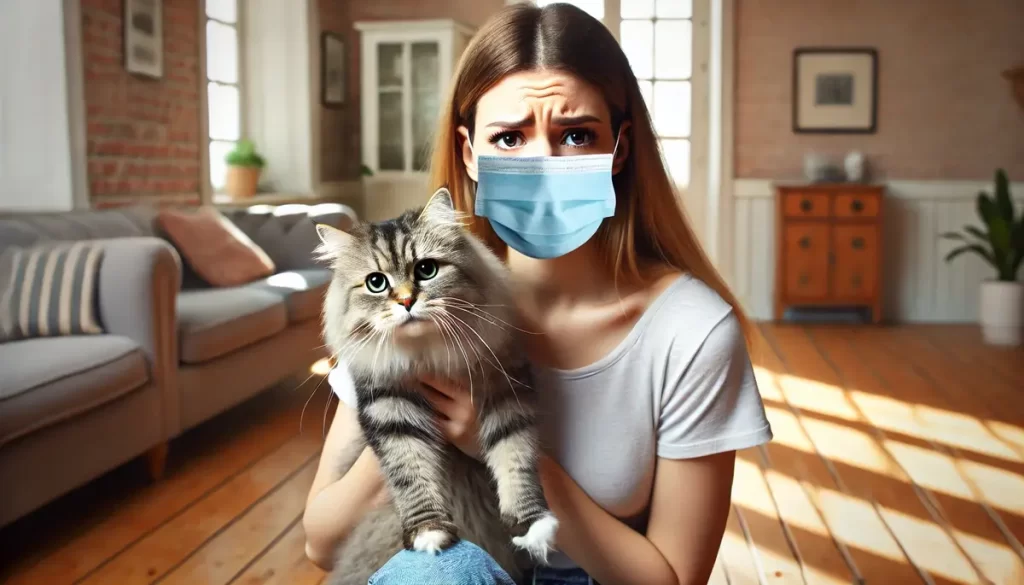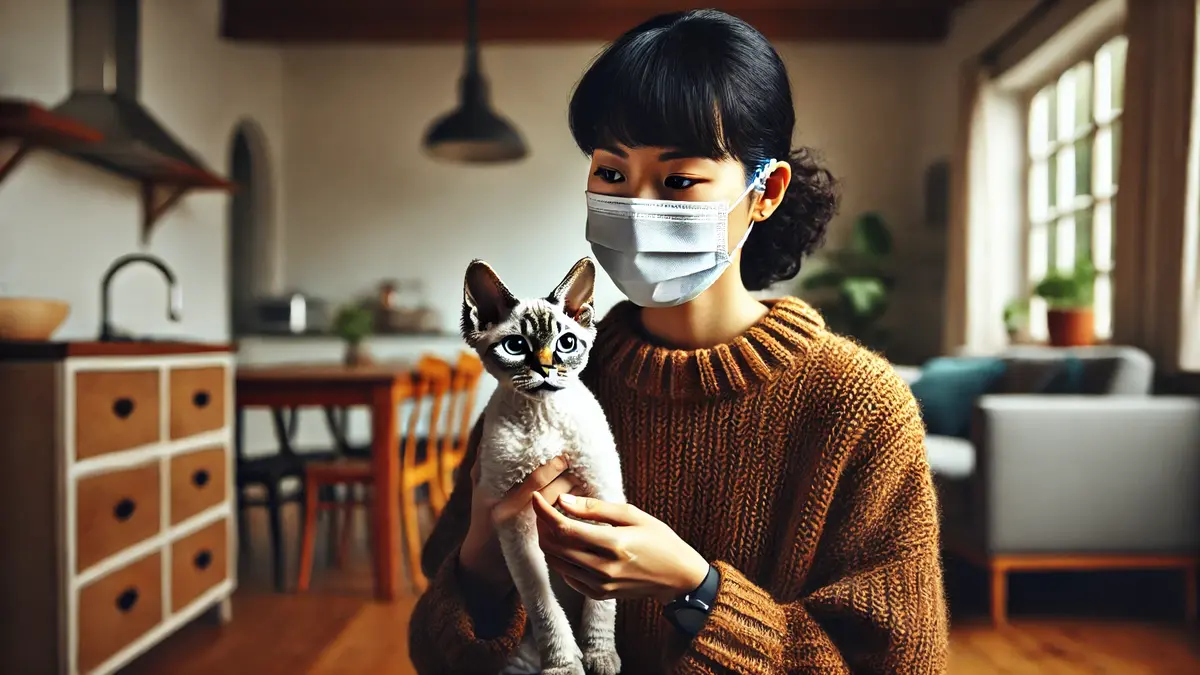If you have allergies and dream of feline companionship, read on. Cat breeds that produce fewer allergens are many and are the ideal ones for those with mild cat allergies. The best hypoallergenic cats are furry companions for anyone who doesn’t want to experience sneezes and sniffles while having a ‘cat’ under their roof, and in this guide we will explore what are some of best hypoallergenic cats.
Why You Should Read This Article
This article is great as it explains everything regarding hypoallergenic cats and what breeds are best for people with allergies to read. If you have been having trouble with allergies to cats, then this article is here to give you a go in the direction of adopting a hypoallergenic breed that makes less allergic substances and can allow you to have the companionship of a cat without allergic reactions.
What Is a Hypoallergenic Cat?
A hypoallergenic cat is a breed that doesn’t create as many allergens as other breeds; this means that patients who are allergic to cats might even find them less likely to react and suffer the effects. These breeds do not specifically remove allergies but reduce the release of proteins such as Fel d 1 that can cause symptoms. Proteins are spread through when cats groom themselves, and these proteins appear in the fur and into the environment when they shed. The allergens are reduced to some degree when a hypoallergenic breed is chosen. In particular, those with a sensitivity to cat allergies but wanting a feline companion will benefit the most from this.

Understanding Cat Allergies
When the immune system responds to proteins in a cat’s saliva, dander or urine, it’s considered to be of cat allergy. The culprit commonest is the Fel d 1 protein, which spreads through the cat’s grooming and sticks to their fur. Airborne dander from cats around roam to causes allergy symptoms such as sneezing, itching and watery eyes. Anyone who is allergic may have varying symptoms based on the level of allergen exposure. This enables us to know which allergy they have so we can decide if its best to get a hypoallergenic cat breed that does not cause severe reactions.
Why Do Some Cats Cause Allergies?
Some breeds of cat make more Fel d 1 allergens than others, which is why some people may be more allergic to some cats than others. Cat saliva, skin oils and urine contain fel d 1, and when cats groom themselves, this protein gets spread all over their fur. The Cats that produce more of that protein or shed a lot are more likely to trigger allergic reactions. But other breeds lower Fel d 1 production and also shed less, so are better for people with cat allergies. It is of utmost importance when determining a cat that’s hypoallergenic.
Understanding Hypoallergenic Cats and Their Breeds
Hypoallergenic cats are highly sought after by people who affected from allergies but still want to enjoy the friendship of a feline. Many wonder, are siamese cats hypoallergenic?, are ragdoll cats hypoallergenic?, or what cats are hypoallergenic? While no cat is entirely allergy-free, certain breeds like Siberian cats, Russian Blue cats, and Bengal cats are considered to produce fewer allergens, making them better choices for allergy sufferers. Cats like the Sphynx, Devon Rex, and Balinese are also notable for being hypoallergenic cats. These cats typically have lower levels of the Fel d 1 protein, which is responsible for triggering allergic reactions. For those curious about hypoallergenic cats for sale or hypoallergenic cats for adoption, these breeds are often in demand, as they provide an option for people looking to avoid excessive sneezing, itching, and other allergy symptoms.
Popular Hypoallergenic Cat Breeds and Care Tips
If you’re asking are maine coon cats hypoallergenic?, are persian cats hypoallergenic?, or are british shorthair cats hypoallergenic?, the answer may not always be straightforward. These breeds are not typically classified as hypoallergenic, but some individuals may still tolerate them better depending on their sensitivity to allergens. For those considering hypoallergenic cats that don’t shed, breeds like the Siberian, Bengal, and Devon Rex are excellent choices as they tend to shed less fur and produce fewer allergens. Many pet owners look for hypoallergenic food for cats to further reduce allergens in their home environment. Additionally, cats that don’t shed hypoallergenic fur, like the Oriental Shorthair and Balinese, can help minimize allergic reactions. For those looking for local options, hypoallergenic cats near me and hypoallergenic cats for adoption near me are common searches.
Top Hypoallergenic Cat Breeds
Several cat breeds are hypoallergenic so they are recognized as a great fit for the people have cat allergies. The Russian Blue, Siberian, Devon Rex, Balinese and Cornish Rex all produce fewer allergens. These cats often have special coat structures that make them less likely to shed and to spread their dander. There are no cat breeds that are completely hypoallergenic, however, these are breeds whose owners consider allergic to cats. However, in choosing a breed, the most important thing to consider is one which is easy and fit into the lifestyle and reduce the chances of an allergic reaction.
The Russian Blue: A Low-Allergen Feline
Russian Blues are one of the more well-known hypoallergenic, producing less Fel d 1 than most other breeds. Its dense short coat sheds minimally and will prove to be an excellent choice for people who are sensitive to allergens. Due to less shedding, this breed only has less spread of dander in the environment and thus fewer allergic reactions. The Russian blue’s temperate and affectionate nature, along with its gentle demeanor, make it a popular choice for families seeking a quiet and low-maintenance pet.
Siberian Cats and Their Hypoallergenic Qualities
Siberian cats have a very long and very luxurious coat but are nonetheless surprisingly hypoallergenic. Fewer studies exist regarding Siberian cats’ Fel d 1 levels than most other breeds; therefore, Siberian cats are unlikely to cause cat allergies. While these cats may shed, they produce a much smaller allergens, making them good for people with mild allergies. And they are such a friendly and playful nature that makes them a great companion. Regular grooming, though, can even reduce allergic symptoms in the average Thuli.

Devon Rex: The Playful, Low-Allergy Breed
The Devon Rex is an active and affectionate breed which is also hypoallergenic. As a cat with a short coat and little shedding, this cat produces fewer allergens that will make your allergic reaction less likely. People who like an energetic and playful pet should also consider getting the Devon Rex. The breed does not shed much dander, making it easier to manage allergies. One of the most popular hypoallergenic cats for families and people who are allergic to cats.
Balinese Cats: Hypoallergenic and Elegant
The Balinese has a long coat despite being one of the most hypoallergenic cat breeds available. And this breed produces less of the Fel d 1 protein which is the primary cause of allergic reactions in humans. Given its propensity to shed less than other long-haired breeds, it is a good choice for people allergic to other dogs. Balinese cats are elegant and affection and also intelligent and easy to train. But they’re low allergen, and most beauties, which is why they’re a leading contender for allergy sufferers who insist on a fluffy pal.
Cornish Rex: A Hypoallergenic Breed with Minimal Shedding
Another good example is the Cornish Rex, a great hypoallergenic cat. Short coated, it doesn’t have an undercoat like most catsmeaning there is less shedding and less spread of allergy provokers like Fel d 1. A homemade family tends to love Cornish Rex cats because they are playful and outgoing. They have an easy to care for coat, but breed is also least low maintenance when it comes to grooming. One of the big reasons they make excellent allergy choices is that they shed less.
Tips for Adopting a Hypoallergenic Cat
The adoption of hypoallergenic cat is something that one should think about carefully, but if you adopt a hypoallergenic cat, you shall take a time to visit it to make sure you do not get any intense shade. Grooming on a regular basis, also frequent cleaning of your home, and washing bedding can reduce the amount of dander in your house. A breed that was known to produce less allergens will help to minimize allergy symptoms. In addition, a good air purifier will allow you to get rid of the cat’s allergens if you have allergies, and it will make life with a cat easier.
Summary: Key Points to Remember
- Hypoallergenic cats create fewer allergens, which makes them a good choice if you are allergy-prone.
- The main cause of cat allergies is the Fel d 1 protein.
- Other breeds which are also good hypoallergenic are the Russian Blue, Siberian and Balinese.
- Allergy sufferers find the cats that shed less and dander less easy to live with.
- And regular grooming, cleaning and air filtration can reduce further the impact of allergens.
FAQs
If you are allergic to cats, which are the best hypoallergenic cat breeds for you?
Several hypoallergenic cat breeds are great when looking for the best for people who are allergic. The Russian Blue, Siberian, Devon Rex, Sphynx cats, Balinese, Bengal, Cornish Rex, Javanese, Tonkinese, and Burmese cats are included in this list. One cat breed known to perform fewer produces allergens and, therefore, can be good for those who suffer from cat allergies.
What makes a cat breed hypoallergenic?
Hypoallergenic cat breed is cat or which produces less of an allergen as compared to other breeds of cats. That protein, Fel d 1, is the one most commonly responsible for this cat allergy. Cats that are low shedding, or have less fur do not spread this allergen around as much in their environment and are therefore more suitable for allergic people.
What are the differences between hypoallergenic cats and the regular cats?
Fel d 1 allergen protein is less produced from hypoallergenic cats, which groom less often to limit spread of allergens. For instance, some breeds, like the Devon Rex and the Cornish Rex, brieflove sacrés de coiffure et portent moins de fourrure – ils perdent moins et produisent moins d’allergènes. Today that makes those plants ideal for people with cat allergies.




Leave feedback about this